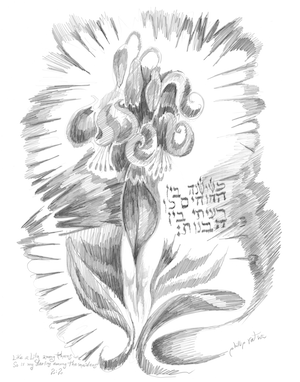Chapter 2:1-2

 I am the rose of Sharon
I am the rose of Sharon
A lily of the valleys.
Like a lily among the thorns,
So is my beloved among the young women.
I flower: bursting with color, vibrancy and proud seed,
I announce my life to the world.
So very bold!
And yet vulnerable to each passing breeze, each mood, each day’s surprise.
Attentive to this patch of ground, I put forth my tendrils, encountering rich soil, immovable rock.
I root myself in the earth of this life, this family, these circumstances—while knowing how fragile is my certainty, how delicate my identity.The garden of my heart is surrounded by wilderness,
A treasure hidden by thick brambles and scrub-oaks
Whose roots spread with vicious intensity,
Blocking the paths, and yet…
I can smell that lily, that apple-blossom shimmering
At the center of my heart, its fragrance calling me.
In the Fever of Love ©2008 Shefa Gold. All rights reserved.
Illustration ©2009 Phillip Ratner, courtesy of the Dennis & Phillip Ratner Museum and the Israel Bible Museum collection. All rights reserved.
Practice
Chant: I Am the Rose of Sharon
Commentary
This is a practice of blossoming forth and rooting down. Although we can’t be sure exactly what flowers these are (various translations include rose, lily, tulip, hyacinth, narcissus, lotus, crocus, wildflower), we do know that these flowers have a resonance in the prophetic traditions of Isaiah 35:1-2 (The desert shall be glad, the wilderness shall rejoice and blossom like the rose) and Hosea 14:6-8 (I will be as the dew to Israel who will blossom as the lily).
As I chant these words I am rising towards the sunlight of glory and redemption, and at the same time connecting myself to the deepest places in the world and in myself. The word for valleys (amakim) also means the depths. When we blossom from those depths, our beauty, however transient, is grounded in the fullness and power of our earthly existence.
Bridge to Torah
Jacob’s flowering is complicated by the thorns of his past, namely Esau and a legacy of deception. Before he meets Esau again, he must encounter his own depths (Shoshanat Haamakim is sometimes translated as the ”rose of the depths”). That beautiful rose , flowering as a new layer of identity, Israel, has thorns that will injure Jacob during his long night of wrestling. Risking those thorns, and making peace with our past, with our lineage is an essential aspect of the journey of awakening.
Click to see Genesis 32:4–36:43 in Hebrew and English (JPS 1985) or the associated Torah Journeys page.
Question for Contemplation
Can I stay rooted in my depths, my lineage, my body, and in my earthiness, while reaching towards the heavens and the great expanse?
Resources
View Love at the Center Resources.
Click to see Song of Songs Chapter 2:1-2 in Hebrew with the English JPS (1985) translation.
